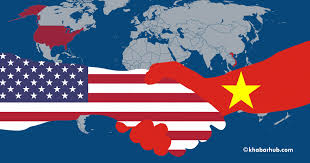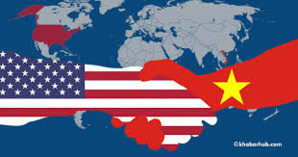On Sunday, U.S. President Joe Biden reached agreements with Vietnam on semiconductors and minerals, elevating Washington to Hanoi's highest diplomatic standing alongside China and Russia. Vietnam is a strategically important Southeast Asian country.
Since the U.S. considers the industrial powerhouse a crucial nation in its strategy to protect global supply chains from China-related dangers, it has been lobbying for the upgrade for months.
Biden landed in Hanoi to a Communist Party-organized celebration that featured honour guards brandishing bayoneted guns and schoolchildren waving American flags, fifty years after a protracted and bloody Cold War battle.
Biden emphasised the steps that had been taken in the direction of stronger ties.
"We can trace a 50-year arc of progress between our nations, from conflict to normalization, to this new elevated status," he said.
The Biden administration is attempting, as Biden told reporters after the meeting in Hanoi, "to demonstrate to our Indo-Pacific partners and to the world, the United States is a Pacific nation and we're not going anywhere," through its cooperation with Vietnam.
Vietnam, a tech and textile exporter, is navigating the chilly relations between Washington and Beijing as it competes with other nations to become a hub for low-cost manufacturing.
In the coming days or weeks, senior Chinese officials, possibly including President Xi Jinping, are anticipated to visit Vietnam as Hanoi works to preserve cordial ties with all superpowers, according to officials and diplomats.
In Hanoi, Biden also claimed that he had spoken with Xi's deputy at the G20 and that they had discussed stability.
Inside the party headquarters, 79-year-old Communist Party General Secretary Nguyen Phu Trong commented to the 80-year-old American president, "You have nary aged a day and I would say you look even better than before."
Vietnam's long-standing ties with Russia are put to the test because of the conflict in Ukraine, including negotiations with Moscow over a new arms contract that would result in U.S. sanctions.
According to documents seen by Reuters, Russia and Vietnam are in negotiations to provide the latter with a credit line so that it can purchase heavy weapons including fighter jets, anti-ship missile systems, anti-submarine helicopters and aircraft, and anti-aircraft missile systems.
One of them, a letter from Pham Minh Chinh, the prime minister of Vietnam, to the government of Russia in May, expressed interest in the potential new agreement.
The validity of the letter and the discussions for a new $8 billion credit line to purchase heavy weapons were both confirmed by a Vietnamese military officer.
Multiple demands for comment on the records, which show Moscow lobbying for months for a financing deal that would avoid Western sanctions on Moscow, went unanswered by a representative of the Vietnamese foreign ministry.
Similar discussions are taking on in Hanoi with a number of armament suppliers, including the US. With top Russian officials, Vietnam has recently held multiple high-level defence consultations.
On the flight with Biden to Vietnam from a Group of 20 conference in India on Sunday, Jon Finer, the U.S. principal deputy national security advisor, told reporters that the U.S.-Vietnam upgrading would have a security component.
Despite stressing that the United States and its allies might assist Vietnam diversify away from Russian military supplies, he said Vietnam was open to the idea and had no arms deals to disclose at this time.
Vietnam's military dependence on Moscow, which Finer described as "a relationship we think they are increasingly uncomfortable with," would be lessened as a result.
The timing of Biden's visit coincides with the expansion of bilateral commercial and investment links and the escalation of a long-running territorial dispute between China and Vietnam in the South China Sea.
In a $10 billion deal timed to the journey, Vietnam Airlines is anticipated to announce an initial agreement to purchase roughly 50 Boeing 737 Max aircraft.
Executives from U.S. technology giants Google, Intel, Amkor, Marvell, GlobalFoundries, and Boeing are scheduled to meet in Hanoi on Monday with Vietnamese tech executives and Secretary of State Antony Blinken to highlight Vietnam's growing significance as a "friendshoring" destination.
Nevertheless, according to U.S. officials, semiconductors are the focal point of an action plan that was adopted during Biden's visit.
What more the relationship would signify, except potential announcements by American businesses, is unknown. Under the CHIPS Act, the US government has access to $100 million per year for five years to boost international semiconductor supply chains.
It may go to Vietnam in major part, according to officials.
As Vietnam struggles with a severe lack of engineers in the semiconductor industry, more funding for the training of competent people is also included in the agreement.
Strengthening supply chains for essential minerals, particularly rare earths, is another important concern, authorities said. According to U.S. estimates, Vietnam has the second-largest resources of rare earths in the world behind China.
An agreement on rare earths is anticipated during Biden's visit, which ends on Monday when he departs for the United States, according to two people familiar with the arrangements.
However, there are few details. According to a person involved in one recent scheme, previous attempts by American companies to collaborate with Vietnamese rare earth companies have failed.
Human rights continue to be a contentious topic, with U.S. government representatives frequently denouncing Hanoi for imprisoning activists and restricting freedom of expression. Diplomats may argue that activists could be released as a sign of goodwill from Vietnam.
(Source:www.firstpost.com)
Since the U.S. considers the industrial powerhouse a crucial nation in its strategy to protect global supply chains from China-related dangers, it has been lobbying for the upgrade for months.
Biden landed in Hanoi to a Communist Party-organized celebration that featured honour guards brandishing bayoneted guns and schoolchildren waving American flags, fifty years after a protracted and bloody Cold War battle.
Biden emphasised the steps that had been taken in the direction of stronger ties.
"We can trace a 50-year arc of progress between our nations, from conflict to normalization, to this new elevated status," he said.
The Biden administration is attempting, as Biden told reporters after the meeting in Hanoi, "to demonstrate to our Indo-Pacific partners and to the world, the United States is a Pacific nation and we're not going anywhere," through its cooperation with Vietnam.
Vietnam, a tech and textile exporter, is navigating the chilly relations between Washington and Beijing as it competes with other nations to become a hub for low-cost manufacturing.
In the coming days or weeks, senior Chinese officials, possibly including President Xi Jinping, are anticipated to visit Vietnam as Hanoi works to preserve cordial ties with all superpowers, according to officials and diplomats.
In Hanoi, Biden also claimed that he had spoken with Xi's deputy at the G20 and that they had discussed stability.
Inside the party headquarters, 79-year-old Communist Party General Secretary Nguyen Phu Trong commented to the 80-year-old American president, "You have nary aged a day and I would say you look even better than before."
Vietnam's long-standing ties with Russia are put to the test because of the conflict in Ukraine, including negotiations with Moscow over a new arms contract that would result in U.S. sanctions.
According to documents seen by Reuters, Russia and Vietnam are in negotiations to provide the latter with a credit line so that it can purchase heavy weapons including fighter jets, anti-ship missile systems, anti-submarine helicopters and aircraft, and anti-aircraft missile systems.
One of them, a letter from Pham Minh Chinh, the prime minister of Vietnam, to the government of Russia in May, expressed interest in the potential new agreement.
The validity of the letter and the discussions for a new $8 billion credit line to purchase heavy weapons were both confirmed by a Vietnamese military officer.
Multiple demands for comment on the records, which show Moscow lobbying for months for a financing deal that would avoid Western sanctions on Moscow, went unanswered by a representative of the Vietnamese foreign ministry.
Similar discussions are taking on in Hanoi with a number of armament suppliers, including the US. With top Russian officials, Vietnam has recently held multiple high-level defence consultations.
On the flight with Biden to Vietnam from a Group of 20 conference in India on Sunday, Jon Finer, the U.S. principal deputy national security advisor, told reporters that the U.S.-Vietnam upgrading would have a security component.
Despite stressing that the United States and its allies might assist Vietnam diversify away from Russian military supplies, he said Vietnam was open to the idea and had no arms deals to disclose at this time.
Vietnam's military dependence on Moscow, which Finer described as "a relationship we think they are increasingly uncomfortable with," would be lessened as a result.
The timing of Biden's visit coincides with the expansion of bilateral commercial and investment links and the escalation of a long-running territorial dispute between China and Vietnam in the South China Sea.
In a $10 billion deal timed to the journey, Vietnam Airlines is anticipated to announce an initial agreement to purchase roughly 50 Boeing 737 Max aircraft.
Executives from U.S. technology giants Google, Intel, Amkor, Marvell, GlobalFoundries, and Boeing are scheduled to meet in Hanoi on Monday with Vietnamese tech executives and Secretary of State Antony Blinken to highlight Vietnam's growing significance as a "friendshoring" destination.
Nevertheless, according to U.S. officials, semiconductors are the focal point of an action plan that was adopted during Biden's visit.
What more the relationship would signify, except potential announcements by American businesses, is unknown. Under the CHIPS Act, the US government has access to $100 million per year for five years to boost international semiconductor supply chains.
It may go to Vietnam in major part, according to officials.
As Vietnam struggles with a severe lack of engineers in the semiconductor industry, more funding for the training of competent people is also included in the agreement.
Strengthening supply chains for essential minerals, particularly rare earths, is another important concern, authorities said. According to U.S. estimates, Vietnam has the second-largest resources of rare earths in the world behind China.
An agreement on rare earths is anticipated during Biden's visit, which ends on Monday when he departs for the United States, according to two people familiar with the arrangements.
However, there are few details. According to a person involved in one recent scheme, previous attempts by American companies to collaborate with Vietnamese rare earth companies have failed.
Human rights continue to be a contentious topic, with U.S. government representatives frequently denouncing Hanoi for imprisoning activists and restricting freedom of expression. Diplomats may argue that activists could be released as a sign of goodwill from Vietnam.
(Source:www.firstpost.com)






